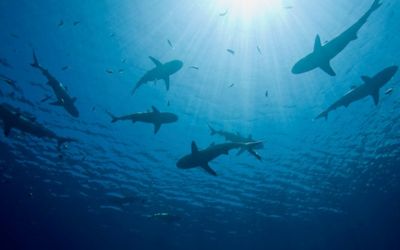Sharks Board looks into hi-tech repellents
by Shaun Harris,
2014-07-25 05:15:37.0
THE KwaZulu-Natal Sharks Board is researching hi-tech methods of keeping sharks away from the coastline.
For the past 30 years nets have been used on 36 beaches. Though they are effective protection for bathers, nets are controversial as they trap sharks and other marine life, which die. More eco-friendly, less harmful technology is being developed. Tests are still at an early stage but an electrical shark repellant is being researched.
Geremy Cliff, head of research, planning and development at the Sharks Board, says though sharks are killed in the nets, the number of deaths has declined by 64% over the past 30 years. About 570 sharks are now caught in nets each year, of which more than 10% are released alive.
Despite this, Mr Cliff says he welcomes more eco-friendly barriers. “We have received funding from the provincial government that allows us to continue research into electrical shark repellent technology first developed in the early 1990s,” he says.
The technology is based on battery-powered electrical pulses, to which sharks are extremely sensitive. Mr Cliff says another possible repellent system is being developed by a company called Sharksafe, using magnets (sharks are also sensitive to magnetic fields) and black plastic piping resembling kelp. He described them as “very encouraging”.
But both alternatives have a way to go. The Sharks Board system has been successfully tested in the calmer waters of the west coast around Cape Town, but Mr Cliff says the rougher east coast surf would “create challenges”.
Surfers, often most at danger of shark attacks, tend to be ecologically aware and dislike sharks being killed in nets. John McCarthy, one of the compilers of the weekly BombSurf News, describes the existing nets as archaic and says “the collateral damage” to marine life “is obscene”.

Picture: THINKSTOCK
THE KwaZulu-Natal Sharks Board is researching hi-tech methods of keeping sharks away from the coastline.
For the past 30 years nets have been used on 36 beaches. Though they are effective protection for bathers, nets are controversial as they trap sharks and other marine life, which die. More eco-friendly, less harmful technology is being developed. Tests are still at an early stage but an electrical shark repellant is being researched.
Geremy Cliff, head of research, planning and development at the Sharks Board, says though sharks are killed in the nets, the number of deaths has declined by 64% over the past 30 years. About 570 sharks are now caught in nets each year, of which more than 10% are released alive.
Despite this, Mr Cliff says he welcomes more eco-friendly barriers. “We have received funding from the provincial government that allows us to continue research into electrical shark repellent technology first developed in the early 1990s,” he says.
The technology is based on battery-powered electrical pulses, to which sharks are extremely sensitive. Mr Cliff says another possible repellent system is being developed by a company called Sharksafe, using magnets (sharks are also sensitive to magnetic fields) and black plastic piping resembling kelp. He described them as “very encouraging”.
But both alternatives have a way to go. The Sharks Board system has been successfully tested in the calmer waters of the west coast around Cape Town, but Mr Cliff says the rougher east coast surf would “create challenges”.
Surfers, often most at danger of shark attacks, tend to be ecologically aware and dislike sharks being killed in nets. John McCarthy, one of the compilers of the weekly BombSurf News, describes the existing nets as archaic and says “the collateral damage” to marine life “is obscene”.















 Register for our
Register for our 




Post a comment